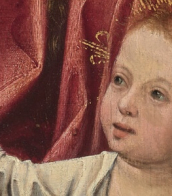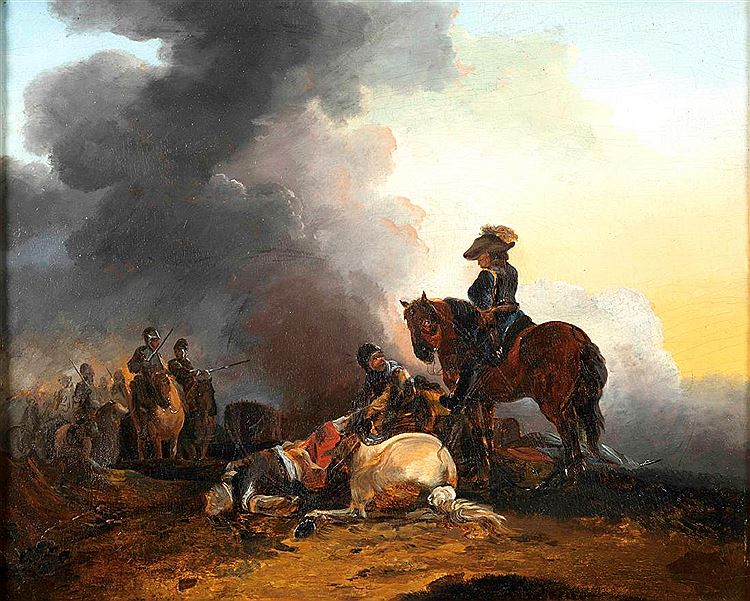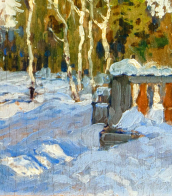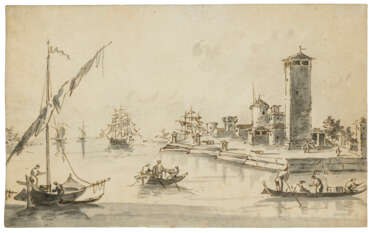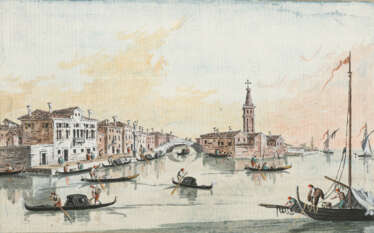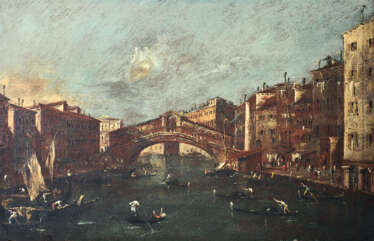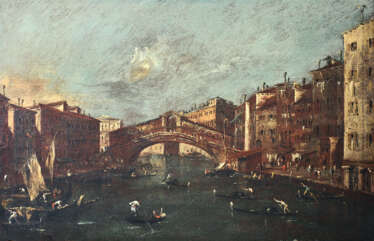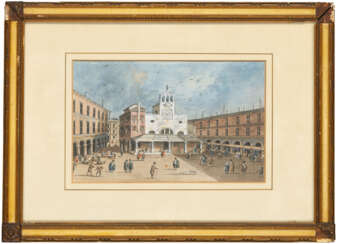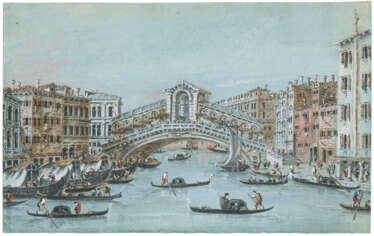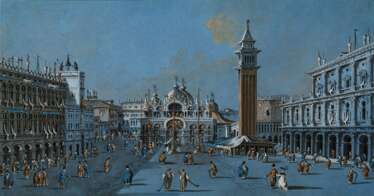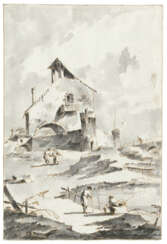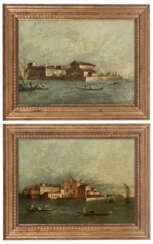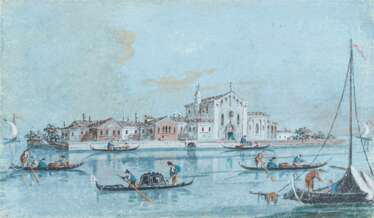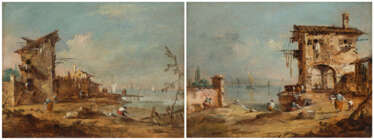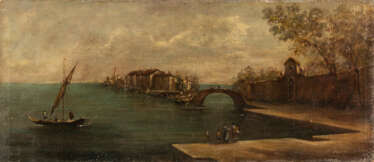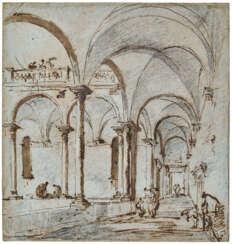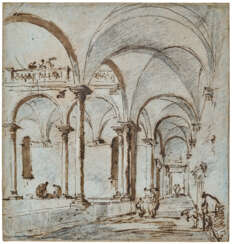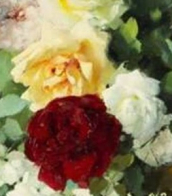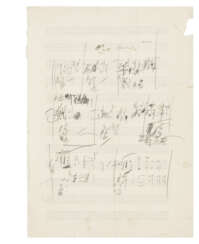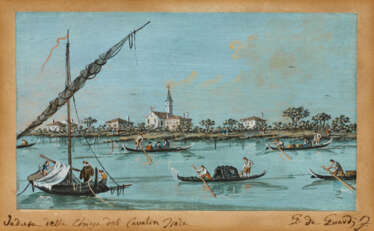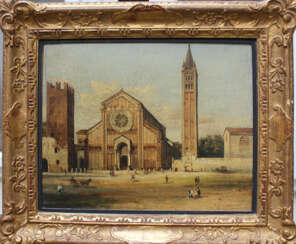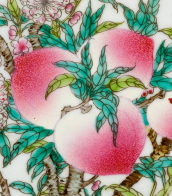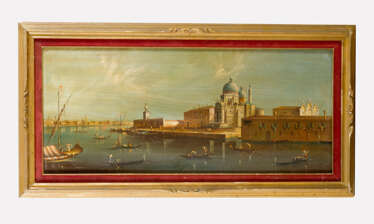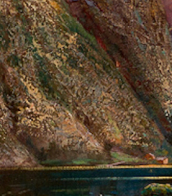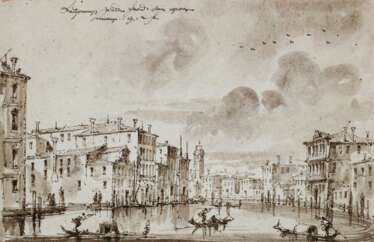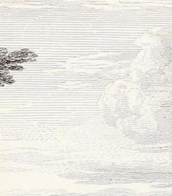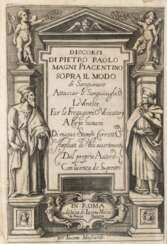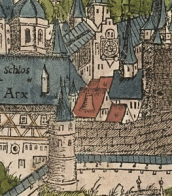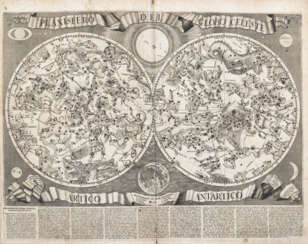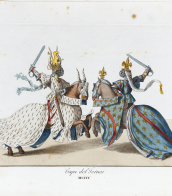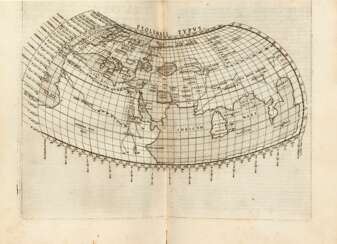giacomo guardi
Giacomo Guardi was an Italian painter from Venice. The son of famous veduta painter Francesco Guardi, he continued his father's line of work, though without the same level of renown. The majority of his works are quite small views of only minor artistic interest, more akin to postcards than to his father's grand scenes, but he produced several paintings showcasing a notable level of artistic skill as well. Evaluating his legacy is somewhat complicated due to the frequency with which paintings are misattributed to him.
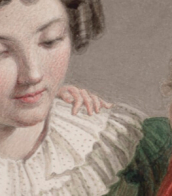
Giacomo Guardi was an Italian painter from Venice. The son of famous veduta painter Francesco Guardi, he continued his father's line of work, though without the same level of renown. The majority of his works are quite small views of only minor artistic interest, more akin to postcards than to his father's grand scenes, but he produced several paintings showcasing a notable level of artistic skill as well. Evaluating his legacy is somewhat complicated due to the frequency with which paintings are misattributed to him.
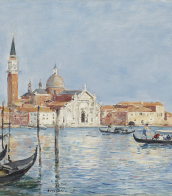
Giacomo Guardi was an Italian painter from Venice. The son of famous veduta painter Francesco Guardi, he continued his father's line of work, though without the same level of renown. The majority of his works are quite small views of only minor artistic interest, more akin to postcards than to his father's grand scenes, but he produced several paintings showcasing a notable level of artistic skill as well. Evaluating his legacy is somewhat complicated due to the frequency with which paintings are misattributed to him.
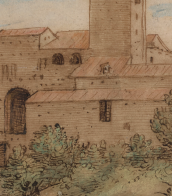
Giacomo Guardi was an Italian painter from Venice. The son of famous veduta painter Francesco Guardi, he continued his father's line of work, though without the same level of renown. The majority of his works are quite small views of only minor artistic interest, more akin to postcards than to his father's grand scenes, but he produced several paintings showcasing a notable level of artistic skill as well. Evaluating his legacy is somewhat complicated due to the frequency with which paintings are misattributed to him.
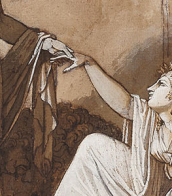
Giacomo Guardi was an Italian painter from Venice. The son of famous veduta painter Francesco Guardi, he continued his father's line of work, though without the same level of renown. The majority of his works are quite small views of only minor artistic interest, more akin to postcards than to his father's grand scenes, but he produced several paintings showcasing a notable level of artistic skill as well. Evaluating his legacy is somewhat complicated due to the frequency with which paintings are misattributed to him.
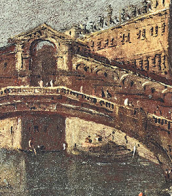
Giacomo Guardi was an Italian painter from Venice. The son of famous veduta painter Francesco Guardi, he continued his father's line of work, though without the same level of renown. The majority of his works are quite small views of only minor artistic interest, more akin to postcards than to his father's grand scenes, but he produced several paintings showcasing a notable level of artistic skill as well. Evaluating his legacy is somewhat complicated due to the frequency with which paintings are misattributed to him.
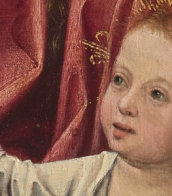
Giacomo Guardi was an Italian painter from Venice. The son of famous veduta painter Francesco Guardi, he continued his father's line of work, though without the same level of renown. The majority of his works are quite small views of only minor artistic interest, more akin to postcards than to his father's grand scenes, but he produced several paintings showcasing a notable level of artistic skill as well. Evaluating his legacy is somewhat complicated due to the frequency with which paintings are misattributed to him.
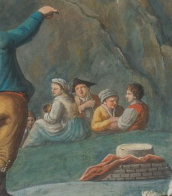
Giacomo Guardi was an Italian painter from Venice. The son of famous veduta painter Francesco Guardi, he continued his father's line of work, though without the same level of renown. The majority of his works are quite small views of only minor artistic interest, more akin to postcards than to his father's grand scenes, but he produced several paintings showcasing a notable level of artistic skill as well. Evaluating his legacy is somewhat complicated due to the frequency with which paintings are misattributed to him.
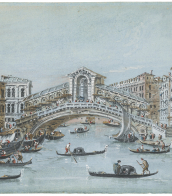
Giacomo Guardi was an Italian painter from Venice. The son of famous veduta painter Francesco Guardi, he continued his father's line of work, though without the same level of renown. The majority of his works are quite small views of only minor artistic interest, more akin to postcards than to his father's grand scenes, but he produced several paintings showcasing a notable level of artistic skill as well. Evaluating his legacy is somewhat complicated due to the frequency with which paintings are misattributed to him.

Giacomo Guardi was an Italian painter from Venice. The son of famous veduta painter Francesco Guardi, he continued his father's line of work, though without the same level of renown. The majority of his works are quite small views of only minor artistic interest, more akin to postcards than to his father's grand scenes, but he produced several paintings showcasing a notable level of artistic skill as well. Evaluating his legacy is somewhat complicated due to the frequency with which paintings are misattributed to him.

Giacomo Guardi was an Italian painter from Venice. The son of famous veduta painter Francesco Guardi, he continued his father's line of work, though without the same level of renown. The majority of his works are quite small views of only minor artistic interest, more akin to postcards than to his father's grand scenes, but he produced several paintings showcasing a notable level of artistic skill as well. Evaluating his legacy is somewhat complicated due to the frequency with which paintings are misattributed to him.
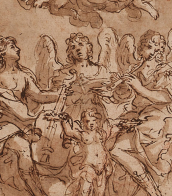
Giacomo Guardi was an Italian painter from Venice. The son of famous veduta painter Francesco Guardi, he continued his father's line of work, though without the same level of renown. The majority of his works are quite small views of only minor artistic interest, more akin to postcards than to his father's grand scenes, but he produced several paintings showcasing a notable level of artistic skill as well. Evaluating his legacy is somewhat complicated due to the frequency with which paintings are misattributed to him.

Giacomo Guardi was an Italian painter from Venice. The son of famous veduta painter Francesco Guardi, he continued his father's line of work, though without the same level of renown. The majority of his works are quite small views of only minor artistic interest, more akin to postcards than to his father's grand scenes, but he produced several paintings showcasing a notable level of artistic skill as well. Evaluating his legacy is somewhat complicated due to the frequency with which paintings are misattributed to him.

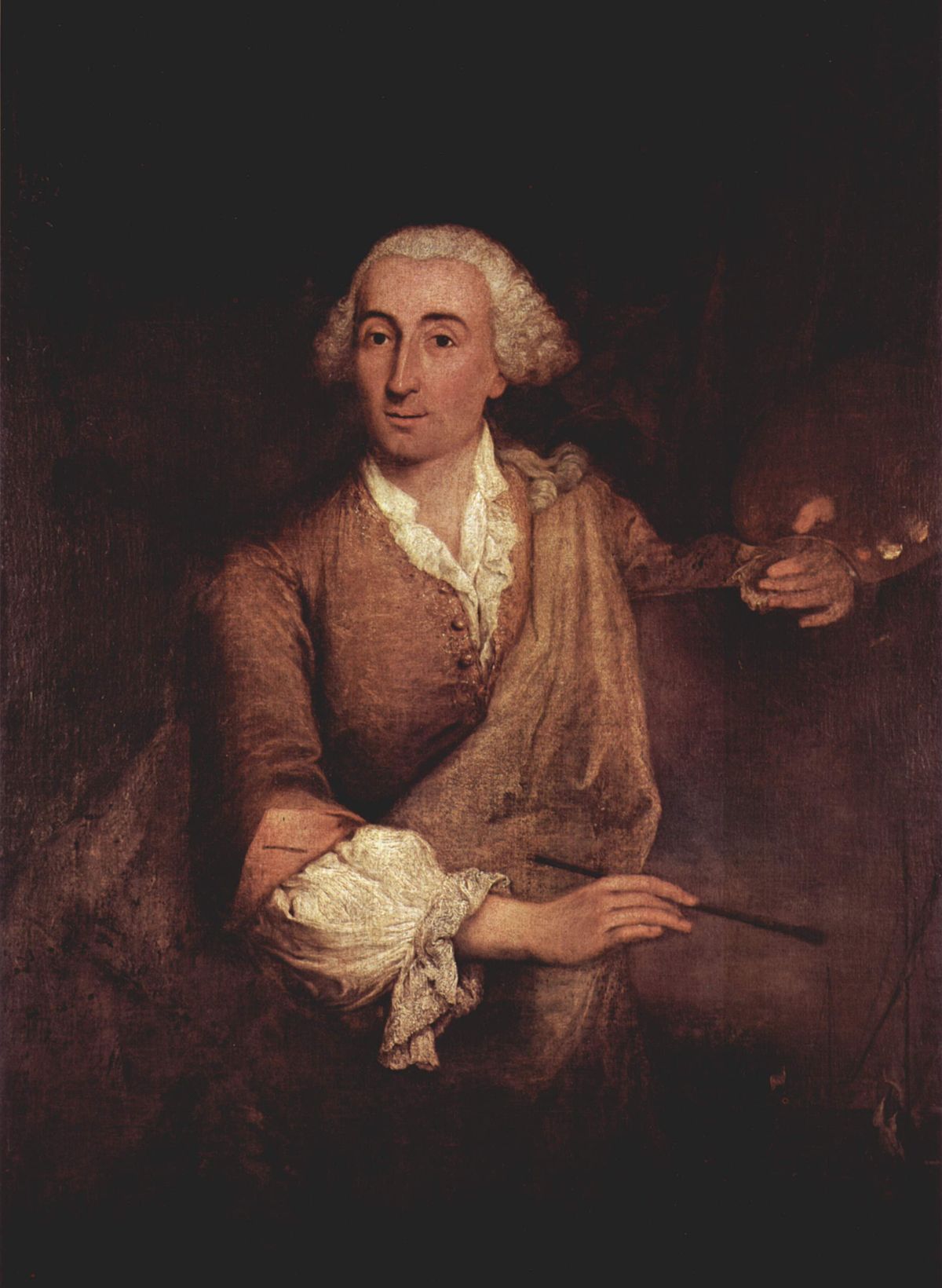
Francesco Lazzaro Guardi was an Italian painter, nobleman, and a member of the Venetian School. He is considered to be among the last practitioners, along with his brothers, of the classic Venetian school of painting.
In the early part of his career he collaborated with his older brother Gian Antonio in the production of religious paintings. After Gian Antonio's death in 1760, Francesco concentrated on vedute. The earliest of these show the influence of Canaletto, but he gradually adopted a looser style characterized by spirited brush-strokes and freely imagined architecture.
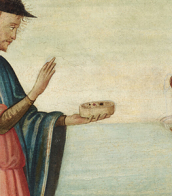
Giacomo Guardi was an Italian painter from Venice. The son of famous veduta painter Francesco Guardi, he continued his father's line of work, though without the same level of renown. The majority of his works are quite small views of only minor artistic interest, more akin to postcards than to his father's grand scenes, but he produced several paintings showcasing a notable level of artistic skill as well. Evaluating his legacy is somewhat complicated due to the frequency with which paintings are misattributed to him.
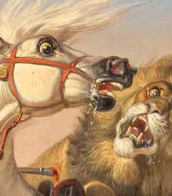

Francesco Lazzaro Guardi was an Italian painter, nobleman, and a member of the Venetian School. He is considered to be among the last practitioners, along with his brothers, of the classic Venetian school of painting.
In the early part of his career he collaborated with his older brother Gian Antonio in the production of religious paintings. After Gian Antonio's death in 1760, Francesco concentrated on vedute. The earliest of these show the influence of Canaletto, but he gradually adopted a looser style characterized by spirited brush-strokes and freely imagined architecture.
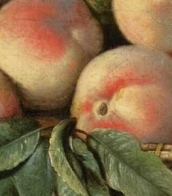
Giacomo Guardi was an Italian painter from Venice. The son of famous veduta painter Francesco Guardi, he continued his father's line of work, though without the same level of renown. The majority of his works are quite small views of only minor artistic interest, more akin to postcards than to his father's grand scenes, but he produced several paintings showcasing a notable level of artistic skill as well. Evaluating his legacy is somewhat complicated due to the frequency with which paintings are misattributed to him.
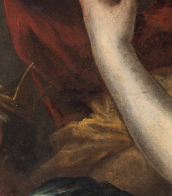
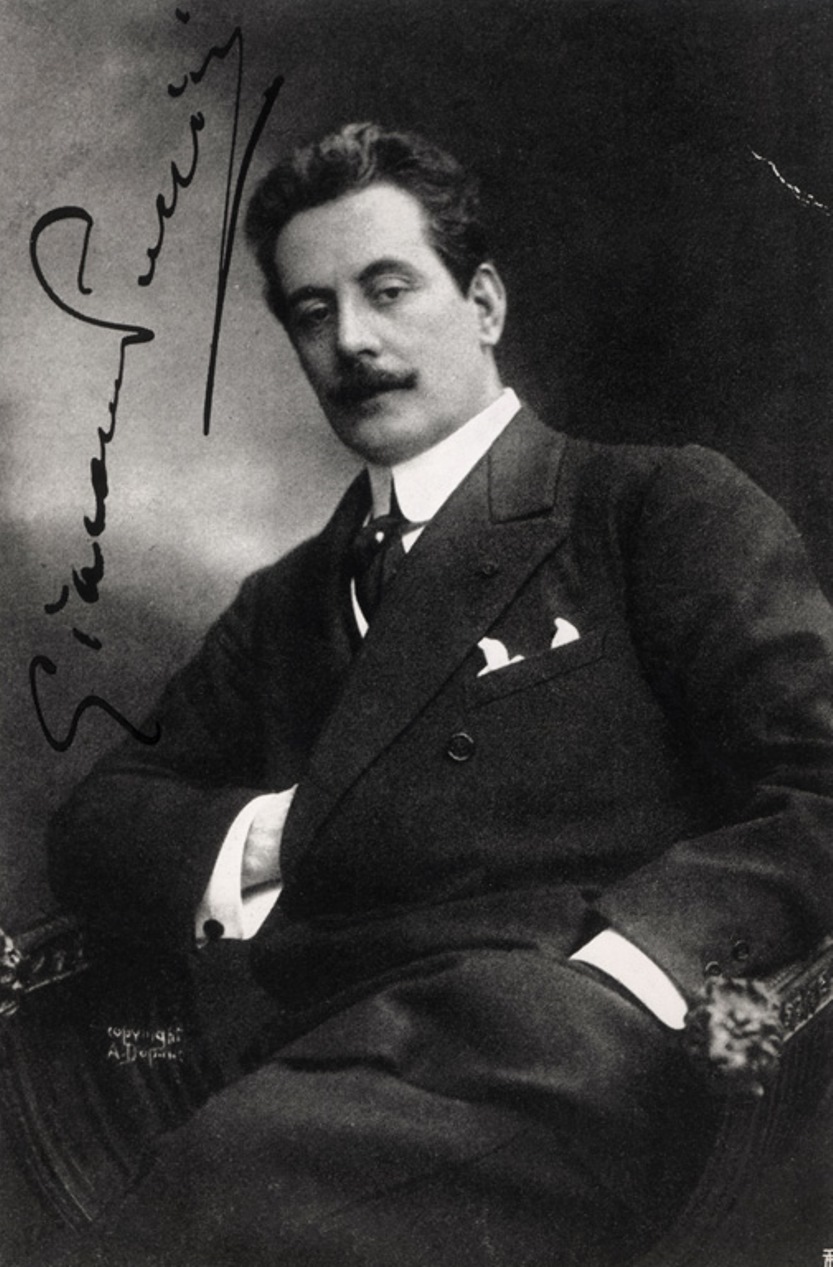
Giacomo Puccini, full name Giacomo Antonio Domenico Michele Secondo Maria Puccini, was an Italian opera composer, organist and choirmaster.
Puccini was born into the family that for two centuries directed the musical organization of the Cathedral of San Martino in Lucca, and the young musician inherited the position of cathedral organist until his adulthood. He also played organ in small local churches. Giuseppe Verdi's opera Aida, which he saw in Pisa in 1876, was a boost for him and he entered the Milan Conservatory in 1880.
Puccini carefully studied contemporary operatic compositions, particularly the work of Claude Debussy, Richard Strauss, Arnold Schoenberg, and Igor Stravinsky. Soon he wrote Triptych (1918), three one-act operas - the melodramatic The Cape, the sentimental Suor Angelica and the comic Gianni Schicchi. Puccini's other mature operas are La bohème (1896), Tosca (1900), and Madama Butterfly (1904).
The composer did not manage to finish his last opera, Turandot - he died of cancer with its score in his hands. This work is the only Italian opera in the Impressionist style. Puccini is also considered the greatest representative of opera realism, as well as the Verismo movement in music, attempting to faithfully portray the social and psychological conflicts of the new national-historical reality after the unification of Italy.
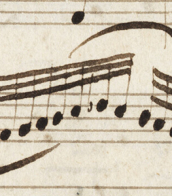
Giacomo Guardi was an Italian painter from Venice. The son of famous veduta painter Francesco Guardi, he continued his father's line of work, though without the same level of renown. The majority of his works are quite small views of only minor artistic interest, more akin to postcards than to his father's grand scenes, but he produced several paintings showcasing a notable level of artistic skill as well. Evaluating his legacy is somewhat complicated due to the frequency with which paintings are misattributed to him.
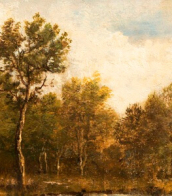
Giacomo Guardi was an Italian painter from Venice. The son of famous veduta painter Francesco Guardi, he continued his father's line of work, though without the same level of renown. The majority of his works are quite small views of only minor artistic interest, more akin to postcards than to his father's grand scenes, but he produced several paintings showcasing a notable level of artistic skill as well. Evaluating his legacy is somewhat complicated due to the frequency with which paintings are misattributed to him.
